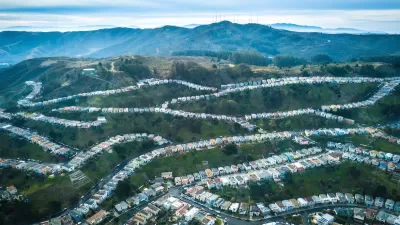The Economist predicts that America's rising population solve more problems that it will create.
"On or around October 17th, according to the Census Bureau's population clock, the number of people in the country will hit 300m, up from 200m in 1967. By as early as 2043, the bureau says, there will be 400m Americans. Such robust growth is unique among rich countries. As America adds 100m people over the next four decades, Japan and the EU are expected to lose almost 15m.
...Can America cope with a relentlessly expanding population? A look at Houston suggests it can. The city is one of America's fastest-growing. The population of Harris County, which includes Houston, grew by 21% in the 1990s, to 3.4m. The surrounding counties are booming, too. Since Houston has no zoning laws, developers can build wherever they think there will be demand. Rather than waiting for the city to extend sewers and power lines to outlying areas, they can issue bonds to pay for such services themselves, and pass the cost on to the people who buy the houses they build.
At the Woodlands, a 28,000-acre (11,300 hectares) planned community north of Houston, you can buy a three-bedroom family home on a quiet wooded street for $130,000. By comparison, the median house price in San Francisco is over $700,000. The Woodlands has good schools, 145 miles (235km) of hiking trails, golf courses designed by the three greatest retired golfers in the world, and a cluster of oil and high-tech firms."
From the CNN article:
Flight to South, West... Since 1967, the American population has undergone several demographic changes. Americans have moved out of the Northeast and Midwest and into the West and the South, according to the Washington-based Population Reference Bureau.
For instance, in 1967, Phoenix, Arizona, had a population just shy of 440,000, according to the Census Bureau. By 2006, the city had 1.5 million residents and was the sixth most populous in the nation. Florida in 1967 had a population of 6.2 million; the Sunshine State now boasts 17.8 million people."
Thanks to Hugh Pavletich
FULL STORY: Now we are 300,000,000

Depopulation Patterns Get Weird
A recent ranking of “declining” cities heavily features some of the most expensive cities in the country — including New York City and a half-dozen in the San Francisco Bay Area.

California Exodus: Population Drops Below 39 Million
Never mind the 40 million that demographers predicted the Golden State would reach by 2018. The state's population dipped below 39 million to 38.965 million last July, according to Census data released in March, the lowest since 2015.

Chicago to Turn High-Rise Offices into Housing
Four commercial buildings in the Chicago Loop have been approved for redevelopment into housing in a bid to revitalize the city’s downtown post-pandemic.

EV Infrastructure Booming in Suburbs, Cities Lag Behind
A lack of access to charging infrastructure is holding back EV adoption in many US cities.

Seattle Road Safety Advocates Say Transportation Levy Perpetuates Car-Centric Status Quo
Critics of a proposed $1.3 billion transportation levy say the package isn’t enough to keep up with inflation and rising costs and fails to support a shift away from car-oriented infrastructure.

Appeals Court: California Emissions Standards Upheld
The U.S. Environmental Protection Agency and the California Air Resources Board, the nation's two most powerful environmental regulatory agencies, won an important round in federal court last week. But the emissions standards battle may not be over.
Barrett Planning Group LLC
City of Cleburne
KTUA Planning and Landscape Architecture
HUD's Office of Policy Development and Research
Mpact Transit + Community
HUD's Office of Policy Development and Research
City of Universal City TX
ULI Northwest Arkansas
City of Laramie, Wyoming
Urban Design for Planners 1: Software Tools
This six-course series explores essential urban design concepts using open source software and equips planners with the tools they need to participate fully in the urban design process.
Planning for Universal Design
Learn the tools for implementing Universal Design in planning regulations.



















